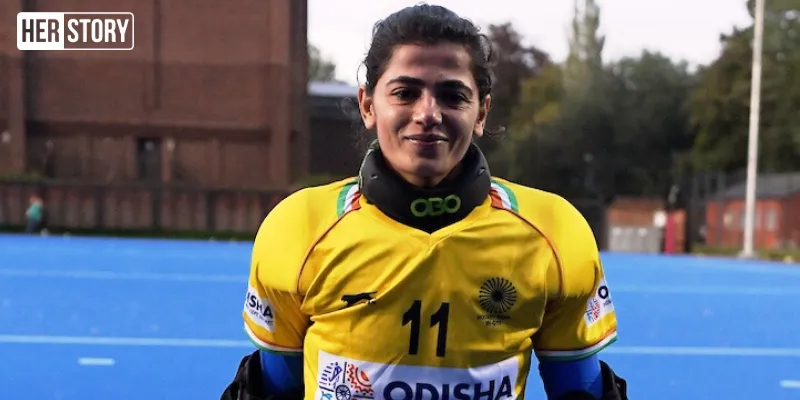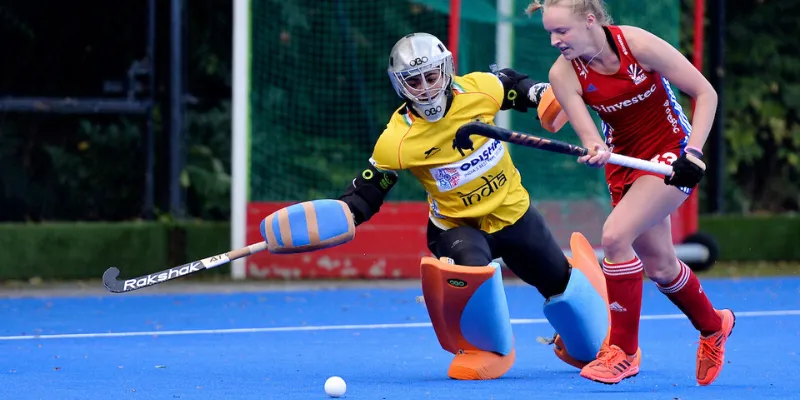Savita Punia went from disliking hockey to becoming vice-captain of Indian team
Savita Punia never played a sport till she was 14; she took up hockey at her grandfather’s insistence. Today, she is the goalkeeper and vice-captain of the Indian hockey team.
The current first-choice goalkeeper and vice-captain of the Indian women’s hockey team Savita Punia had never played a sport until she was 14 years old. It was by chance that a local coach informed her parents about selections for hockey, judo, and badminton in her hometown, Sirsa. Her grandfather, Ranjit Singh Punia, persuaded her to take up the opportunity to play hockey.
“My grandfather used to like hockey very much, but no one from my family had played any sport. So, he told me if I got the chance, I should play hockey. That is how my journey started,” Savita tells HerStory in an exclusive interview.

Savita Punia, the vice-captain and goalkeeper of the Indian hockey team.
As a 14-year-old, Savita began playing hockey and slowly climbed up the rungs to play for her state team, junior national team and eventually for the senior side. She made her debut for the national team in 2008, but had to wait for some more years to become the team’s first-choice goalkeeper.
Today, Savita is more than just the first choice. She is also the vice-captain of the team, assisting captain Rani Rampal. Her consistent performances and winning efforts have brought her several accolades, including the Arjuna Award in 2018.
The calm, composed, and steel-nerved keeper reveals more about her career in a chat with HerStory.
HerStory: Who is your biggest inspiration?
Savita Punia: My biggest inspiration has to be my grandfather. He always supported me so much. He was always very encouraging and I think I am where I am today because of his encouragement and blessings. I remember when I had first played for India, dadaji heard that the news was in the newspaper, and at 67 years of age, he decided to learn to read. After a year or so, he learned reading and then made me sit with him and read the news out loud. It was a really great moment, and the biggest inspiration for me.
Edited excerpts from the interview:
HS: How did you decide to become a goalkeeper?
SP: The choices I make now are my choices but back then I didn’t really have a choice (laughs). I would really struggle initially and wouldn’t want to play, but in 2005, it was my first coach, Sundar Singh Kharab, who told my father that I had good height and I could play for India if I played as a goalkeeper.
But he said my dad would have to buy a kit. I remember my dad only used to earn about Rs 11,000 to 12,000, and the kit cost nearly Rs 18,000. I didn’t know about this conversation back then, but my mother told me that my coach and my dad had discussed it and took the decision for me.
It felt like a burden to me. I started to think that even if I returned the kit, the money might come back but my dad wouldn’t be satisfied. I also felt that I would never be able to make it that far. But once I started playing, I performed well in domestic tournaments. Whenever I would return home, I would be treated so well by dadaji; seeing him so happy really motivated me to take up the sport seriously.
HS: How was the first experience of representing India?
SP: When I got selected for the first time, it was really unexpected for me because there were seven goalkeepers in the camp and many senior players in our team. So, I wasn’t really expecting to be selected.
Like I said, I was never really serious about playing hockey. I would call my parents from the camp and tell my mother that I wanted to come back home. I just wasn’t the kind of person who liked that environment. However, that first tournament in 2008 with the senior team in Germany and Holland changed my perception.
I remember the first time I stepped on to the field and sang the national anthem - I had goosebumps and decided that I wanted to do it wholeheartedly. It was a life-changing moment for me. Even though I was the second-choice goalkeeper then, after Dipika Murthy, it was a great experience.

Savita Punia in action for India.
HS: As the vice-captain of the team, what are your responsibilities?
SP: It is a huge role but we have a lot of experienced players in our team. There is a bunch of senior players always ready to guide the youngsters. It is a great team environment and as the vice-captain, I try to ensure that all the younger players feel comfortable in the group, and are able to prepare themselves in circumstances which can help them give their best for the team each time they go out there.
It is important to interact and share your experiences, both good and bad, to make sure they realise that we’ve been through the same, and it happens to everyone.
HS: What do you love most about hockey?
SP: My family has received great respect through hockey - and that is my favourite part. When I had started playing, no one used to really play any sport in my village. Now, because of my performances and because people have gotten to know about me, hockey and other sports like football have become popular in Sirsa. We have many girls playing now.
HS: You were part of the team that played at the Rio Olympics. Tell us about that experience? How did you feel about it?
SP: The results didn’t go our way, and it was one of the worst tournaments for me, personally. But, it taught us a lot. About 10 players from that 2016 team are still in the 25-member core probables group. So, the lessons from Rio will certainly help us in the future.
HS: How do you think the Indian team will do at the 2021 Olympics? What did you think when the Olympics 2020 was postponed?
SP: When the Olympics were postponed, it was definitely disappointing for me because we’ve spent the last four years preparing to peak this year. However, we realised that it was the right call. We’ve all adjusted to it now, and are looking forward to working hard once we are back on the pitch.
I’m expecting a big performance from my team. All the 25 girls in the core probables group had been working really hard. With one more year to prepare, I am confident that we will be able to perform the way we would like to. Our goal will be to go for the podium.
Edited by Javed Gaihlot







